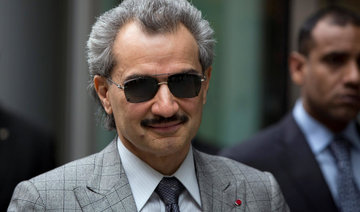DUBAI: Alwaleed Philanthropies, the charitable organization founded by Saudi Prince Alwaleed bin Talal, has given an extra $20.6 million to fight the coronavirus pandemic in the Middle East, Africa and Asia.
The donation, in partnership with some of the world’s leading philanthropies, comes on top of the organization’s existing funding of $9.4 million, which has been reallocated to fight the pandemic. This brings the prince’s total commitment to medical and economic help to $30 million.
“In these times of unprecedented crisis it is more important now than ever that we pull our resources together in the battle against COVID-19,” he said.
“With many developed nations struggling to cope with the COVID-19 pandemic, we must spare a thought for the developing countries of Africa and the less fortunate countries in the Middle East.”
The $30 million comes after he pledged the use of his hotels, schools and other businesses in Saudi Arabia to support the government’s measures against the pandemic, and support for Lebanese students studying in virus-ravaged Europe to return home.
The funds will be spent on a variety of initiatives, including those led by the Bill & Melinda Gates Foundation, the GAVI vaccination projects, the World Health Organization (WHO) and the UN Educational, Scientific and Cultural Organization.
“The series of impact-driven initiatives will seek to tackle the health and economic implications of the pandemic, such as manufacturing rapid diagnostic tests for developing countries and reducing the long-term impact of the potential economic fallout of COVID-19,” Alwaleed Philanthropies said.
“Continuing to support the Middle East and North Africa, the fund includes a significant allocation towards initiatives including allocation to UN-Habitat to improve water, sanitation and hygiene in the most vulnerable communities, and to establish shelter and rehabilitate damaged housings in order to address overcrowding and enable social / physical distancing in disadvantaged neighborhoods.”
Alwaleed Philanthropies is also working with the Islamic World Educational, Scientific and Cultural Organization (ICESCO) to mitigate the economic fallout of the crisis in Africa while promoting hygiene in developing countries.
The amount allocated to ICESCO will strengthen local manufacturing capabilities to produce hygiene products and protective equipment, while empowering women and young entrepreneurs in the informal and local sector.
Many of the initiatives will support vital work to support communities and curb the spread of COVID-19.
Alwaleed Philanthropies will be working with Gates Philanthropy Partners to fund health projects to accelerate the development of therapeutics and delivery of diagnostics to protect vulnerable populations across Africa.
This includes an allocation to the Africa Centres for Disease Control and Prevention, which will allow for additional diagnostic laboratories and testing capabilities throughout the continent.
Additionally, Alwaleed Philanthropies is building upon its existing relationship with Splash to provide clean water and promote hand washing in rural and urban areas in South Asia and Africa.
Supporting scientific research to reduce future outbreaks, Alwaleed Philanthropies has built on its four-year relationship with GAVI, with a further amount allocated to provide accessibility and innovative solutions to reach remote areas, and an allocation to support the WHO in strengthening its existing procurement capacity to rapidly secure needed emergency products and build a global stockpile.
Separately, GAVI — backed by Saudi Arabia — on Monday made $40 million available to the UN Children’s Fund to secure personal protective equipment, diagnostic tests and other vital supplies on behalf of 58 low-income countries in response to the pandemic, bringing its total support so far in the crisis to $200 million.




























